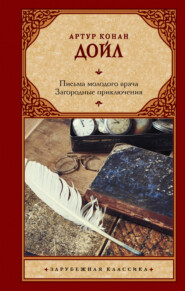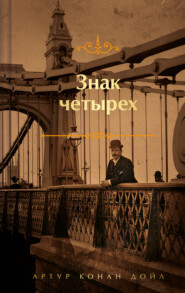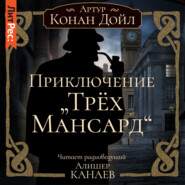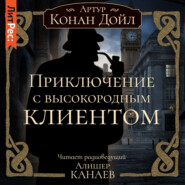По всем вопросам обращайтесь на: info@litportal.ru
(©) 2003-2024.
✖
The Man from Archangel, and Other Tales of Adventure
Настройки чтения
Размер шрифта
Высота строк
Поля
"What!" I cried, "Mr. Stanislaus Stanniford!"
"Here he has sat for seven years. Oh, why would he do it? I begged him, I implored him, I went on my knees to him, but he would have his way. You see the key on the table. He had locked the door upon the inside. And he has written something. We must take it."
"Yes, yes, take it, and for God's sake, let us get out of this," I cried; "the air is poisonous. Come, Stanniford, come!" Taking an arm each, we half led and half carried the terrified man back to his own room.
"It was my father!" he cried, as he recovered his consciousness. "He is sitting there dead in his chair. You knew it, Perceval! This was what you meant when you warned me."
"Yes, I knew it, Mr. Stanniford. I have acted for the best all along, but my position has been a terribly difficult one. For seven years I have known that your father was dead in that room."
"You knew it, and never told us!"
"Don't be harsh with me, Mr. Stanniford, sir! Make allowance for a man who has had a hard part to play."
"My head is swimming round. I cannot grasp it!" He staggered up, and helped himself from the brandy bottle. "These letters to my mother and to myself – were they forgeries?"
"No, sir; your father wrote them and addressed them, and left them in my keeping to be posted. I have followed his instructions to the very letter in all things. He was my master, and I have obeyed him."
The brandy had steadied the young man's shaken nerves. "Tell me about it. I can stand it now," said he.
"Well, Mr. Stanniford, you know that at one time there came a period of great trouble upon your father, and he thought that many poor people were about to lose their savings through his fault. He was a man who was so tender-hearted that he could not bear the thought. It worried him and tormented him, until he determined to end his life. Oh, Mr. Stanniford, if you knew how I have prayed him and wrestled with him over it, you would never blame me! And he in turn prayed me as no man has ever prayed me before. He had made up his mind, and he would do it in any case, he said; but it rested with me whether his death should be happy and easy or whether it should be most miserable. I read in his eyes that he meant what he said. And at last I yielded to his prayers, and I consented to do his will.
"What was troubling him was this. He had been told by the first doctor in London that his wife's heart would fail at the slightest shock. He had a horror of accelerating her end, and yet his own existence had become unendurable to him. How could he end himself without injuring her?
"You know now the course that he took. He wrote the letter which she received. There was nothing in it which was not literally true. When he spoke of seeing her again so soon, he was referring to her own approaching death, which he had been assured could not be delayed more than a very few months. So convinced was he of this, that he only left two letters to be forwarded at intervals after his death. She lived five years, and I had no letters to send.
"He left another letter with me to be sent to you, sir, upon the occasion of the death of your mother. I posted all these in Paris to sustain the idea of his being abroad. It was his wish that I should say nothing, and I have said nothing. I have been a faithful servant. Seven years after his death, he thought no doubt that the shock to the feelings of his surviving friends Would be lessened. He was always considerate for others."
There was a silence for some time. It was broken by young Stanniford.
"I cannot blame you, Perceval. You have spared my mother a shock, which would certainly have broken her heart. What is that paper?"
"It is what your father was writing, sir. Shall I read it to you?"
"Do so."
"'I have taken the poison, and I feel it working in my veins. It is strange, but not painful. When these words are read I shall, if my wishes have been faithfully carried out, have been dead many years. Surely no one who has lost money through me will still bear me animosity. And you, Felix, you will forgive me this family scandal. May God find rest for a sorely wearied spirit!'"
"Amen!" we cried, all three.
TALES OF MEDICAL LIFE
VII
A PHYSIOLOGIST'S WIFE
Professor Ainslie Grey had not come down to breakfast at the usual hour. The presentation chiming-clock which stood between the terra-cotta busts of Claude Bernard and of John Hunter upon the dining-room mantelpiece had rung out the half-hour and the three-quarters. Now its golden hand was verging upon the nine, and yet there were no signs of the master of the house.
It was an unprecedented occurrence. During the twelve years that she had kept house for him, his younger sister had never known him a second behind his time. She sat now in front of the high silver coffee-pot, uncertain whether to order the gong to be resounded or to wait on in silence. Either course might be a mistake. Her brother was not a man who permitted mistakes.
Miss Ainslie Grey was rather above the middle height, thin, with peering, puckered eyes, and the rounded shoulders which mark the bookish woman. Her face was long and spare, flecked with colour above the cheek-bones, with a reasonable, thoughtful forehead, and a dash of absolute obstinacy in her thin lips and prominent chin. Snow-white cuffs and collar, with a plain dark dress, cut with almost Quaker-like simplicity, bespoke the primness of her taste. An ebony cross hung over her flattened chest. She sat very upright in her chair, listening with raised eyebrows, and swinging her eye-glasses backwards and forwards with a nervous gesture which was peculiar to her.
Suddenly she gave a sharp, satisfied jerk of the head, and began to pour out the coffee. From outside there came the dull thudding sound of heavy feet Upon thick carpet. The door swung open, and the Professor entered with a quick, nervous step. He nodded to his sister, and seating himself at the other side of the table, began to open the small pile of letters which lay beside his plate.
Professor Ainslie Grey was at that time forty-three years of age – nearly twelve years older than his sister. His career had been a brilliant one. At Edinburgh, at Cambridge, and at Vienna he had laid the foundations of his great reputation, both in physiology and in zoology.
His pamphlet, "On the Mesoblastic Origin of Excitomotor Nerve Roots," had won him his fellowship of the Royal Society; and his researches, "Upon the Nature of Bathybius, with some Remarks upon Lithococci," had been translated into at least three European languages. He had been referred to by one of the greatest living authorities as being the very type and embodiment of all that was best in modern science. No wonder, then, that when the commercial city of Birchespool decided to create a medical school, they were only too glad to confer the chair of physiology upon Mr. Ainslie Grey. They valued him the more from the conviction that their class was only one step in his upward journey, and that the first vacancy would remove him to some more illustrious seat of learning.
In person he was not unlike his sister. The same eyes, the same contour, the same intellectual forehead. His lips, however, were firmer, and his long, thin lower jaw was sharper and more decided. He ran his finger and thumb down it from time to time, as he glanced over his letters.
"Those maids are very noisy," he remarked, as a clack of tongues sounded in the distance.
"It is Sarah," said his sister; "I shall speak about it."
She had handed over his coffee-cup, and was sipping at her own, glancing furtively through her narrowed lids at the austere face of her brother.
"The first great advance of the human race," said the Professor, "was when, by the development of their left frontal convolutions, they attained the power of speech. Their second advance was when they learned to control that power. Woman has not yet attained the second stage."
He half closed his eyes as he spoke, and thrust his chin forward, but as he ceased he had a trick of suddenly opening both eyes very wide and staring sternly at his interlocutor.
"I am not garrulous, John," said his sister.
"No, Ada; in many respects you approach the superior or male type."
The Professor bowed over his egg with the manner of one who utters a courtly compliment; but the lady pouted, and gave an impatient little shrug of her shoulders.
"You were late this morning, John," she remarked, after a pause.
"Yes, Ada; I slept badly. Some little cerebral congestion, no doubt due to over-stimulation of the centres of thought. I have been a little disturbed in my mind."
His sister stared across at him in astonishment. The Professor's mental processes had hitherto been as regular as his habits. Twelve years' continual intercourse had taught her that he lived in a serene and rarefied atmosphere of scientific calm, high above the petty emotions which affect humbler minds.
"You are surprised, Ada," he remarked. "Well, I cannot wonder at it. I should have been surprised myself if I had been told that I was so sensitive to vascular influences. For, after all, all disturbances are vascular if you probe them deep enough. I am thinking of getting married."
"Not Mrs. O'James?" cried Ada Grey, laying down her egg-spoon.
"My dear, you have the feminine quality of receptivity very remarkably developed. Mrs. O'James is the lady in question."
"But you know so little of her. The Esdailes themselves know so little. She is really only an acquaintance, although she is staying at The Lindens. Would it not be wise to speak to Mrs. Esdaile first, John?"
"I do not think, Ada, that Mrs. Esdaile is at all likely to say anything which would materially affect my course of action. I have given the matter due consideration. The scientific mind is slow at arriving at conclusions, but having once formed them, it is not prone to change. Matrimony is the natural condition of the human race. I have, as you know, been so engaged in academical and other work, that I have had no time to devote to merely personal questions. It is different now, and I see no valid reason why I should forego this opportunity of seeking a suitable helpmate."
"And you are engaged?"
"Hardly that, Ada. I ventured yesterday to indicate to the lady that I was prepared to submit to the common lot of humanity. I shall wait upon her after my morning lecture, and learn how far my proposals meet with her acquiescence. But you frown, Ada!"
His sister started, and made an effort to conceal her expression of annoyance. She even stammered out some few words of congratulation, but a vacant look had come into her brother's eyes, and he was evidently not listening to her.
"I am sure, John," she said, "that I wish you the happiness which you deserve. If I hesitated at all, it is because I know how much is at stake, and because the thing is so sudden, so unexpected." Her thin white hand stole up to the black cross upon her bosom. "These are moments when we need guidance, John. If I could persuade you to turn to spiritual – "
"Here he has sat for seven years. Oh, why would he do it? I begged him, I implored him, I went on my knees to him, but he would have his way. You see the key on the table. He had locked the door upon the inside. And he has written something. We must take it."
"Yes, yes, take it, and for God's sake, let us get out of this," I cried; "the air is poisonous. Come, Stanniford, come!" Taking an arm each, we half led and half carried the terrified man back to his own room.
"It was my father!" he cried, as he recovered his consciousness. "He is sitting there dead in his chair. You knew it, Perceval! This was what you meant when you warned me."
"Yes, I knew it, Mr. Stanniford. I have acted for the best all along, but my position has been a terribly difficult one. For seven years I have known that your father was dead in that room."
"You knew it, and never told us!"
"Don't be harsh with me, Mr. Stanniford, sir! Make allowance for a man who has had a hard part to play."
"My head is swimming round. I cannot grasp it!" He staggered up, and helped himself from the brandy bottle. "These letters to my mother and to myself – were they forgeries?"
"No, sir; your father wrote them and addressed them, and left them in my keeping to be posted. I have followed his instructions to the very letter in all things. He was my master, and I have obeyed him."
The brandy had steadied the young man's shaken nerves. "Tell me about it. I can stand it now," said he.
"Well, Mr. Stanniford, you know that at one time there came a period of great trouble upon your father, and he thought that many poor people were about to lose their savings through his fault. He was a man who was so tender-hearted that he could not bear the thought. It worried him and tormented him, until he determined to end his life. Oh, Mr. Stanniford, if you knew how I have prayed him and wrestled with him over it, you would never blame me! And he in turn prayed me as no man has ever prayed me before. He had made up his mind, and he would do it in any case, he said; but it rested with me whether his death should be happy and easy or whether it should be most miserable. I read in his eyes that he meant what he said. And at last I yielded to his prayers, and I consented to do his will.
"What was troubling him was this. He had been told by the first doctor in London that his wife's heart would fail at the slightest shock. He had a horror of accelerating her end, and yet his own existence had become unendurable to him. How could he end himself without injuring her?
"You know now the course that he took. He wrote the letter which she received. There was nothing in it which was not literally true. When he spoke of seeing her again so soon, he was referring to her own approaching death, which he had been assured could not be delayed more than a very few months. So convinced was he of this, that he only left two letters to be forwarded at intervals after his death. She lived five years, and I had no letters to send.
"He left another letter with me to be sent to you, sir, upon the occasion of the death of your mother. I posted all these in Paris to sustain the idea of his being abroad. It was his wish that I should say nothing, and I have said nothing. I have been a faithful servant. Seven years after his death, he thought no doubt that the shock to the feelings of his surviving friends Would be lessened. He was always considerate for others."
There was a silence for some time. It was broken by young Stanniford.
"I cannot blame you, Perceval. You have spared my mother a shock, which would certainly have broken her heart. What is that paper?"
"It is what your father was writing, sir. Shall I read it to you?"
"Do so."
"'I have taken the poison, and I feel it working in my veins. It is strange, but not painful. When these words are read I shall, if my wishes have been faithfully carried out, have been dead many years. Surely no one who has lost money through me will still bear me animosity. And you, Felix, you will forgive me this family scandal. May God find rest for a sorely wearied spirit!'"
"Amen!" we cried, all three.
TALES OF MEDICAL LIFE
VII
A PHYSIOLOGIST'S WIFE
Professor Ainslie Grey had not come down to breakfast at the usual hour. The presentation chiming-clock which stood between the terra-cotta busts of Claude Bernard and of John Hunter upon the dining-room mantelpiece had rung out the half-hour and the three-quarters. Now its golden hand was verging upon the nine, and yet there were no signs of the master of the house.
It was an unprecedented occurrence. During the twelve years that she had kept house for him, his younger sister had never known him a second behind his time. She sat now in front of the high silver coffee-pot, uncertain whether to order the gong to be resounded or to wait on in silence. Either course might be a mistake. Her brother was not a man who permitted mistakes.
Miss Ainslie Grey was rather above the middle height, thin, with peering, puckered eyes, and the rounded shoulders which mark the bookish woman. Her face was long and spare, flecked with colour above the cheek-bones, with a reasonable, thoughtful forehead, and a dash of absolute obstinacy in her thin lips and prominent chin. Snow-white cuffs and collar, with a plain dark dress, cut with almost Quaker-like simplicity, bespoke the primness of her taste. An ebony cross hung over her flattened chest. She sat very upright in her chair, listening with raised eyebrows, and swinging her eye-glasses backwards and forwards with a nervous gesture which was peculiar to her.
Suddenly she gave a sharp, satisfied jerk of the head, and began to pour out the coffee. From outside there came the dull thudding sound of heavy feet Upon thick carpet. The door swung open, and the Professor entered with a quick, nervous step. He nodded to his sister, and seating himself at the other side of the table, began to open the small pile of letters which lay beside his plate.
Professor Ainslie Grey was at that time forty-three years of age – nearly twelve years older than his sister. His career had been a brilliant one. At Edinburgh, at Cambridge, and at Vienna he had laid the foundations of his great reputation, both in physiology and in zoology.
His pamphlet, "On the Mesoblastic Origin of Excitomotor Nerve Roots," had won him his fellowship of the Royal Society; and his researches, "Upon the Nature of Bathybius, with some Remarks upon Lithococci," had been translated into at least three European languages. He had been referred to by one of the greatest living authorities as being the very type and embodiment of all that was best in modern science. No wonder, then, that when the commercial city of Birchespool decided to create a medical school, they were only too glad to confer the chair of physiology upon Mr. Ainslie Grey. They valued him the more from the conviction that their class was only one step in his upward journey, and that the first vacancy would remove him to some more illustrious seat of learning.
In person he was not unlike his sister. The same eyes, the same contour, the same intellectual forehead. His lips, however, were firmer, and his long, thin lower jaw was sharper and more decided. He ran his finger and thumb down it from time to time, as he glanced over his letters.
"Those maids are very noisy," he remarked, as a clack of tongues sounded in the distance.
"It is Sarah," said his sister; "I shall speak about it."
She had handed over his coffee-cup, and was sipping at her own, glancing furtively through her narrowed lids at the austere face of her brother.
"The first great advance of the human race," said the Professor, "was when, by the development of their left frontal convolutions, they attained the power of speech. Their second advance was when they learned to control that power. Woman has not yet attained the second stage."
He half closed his eyes as he spoke, and thrust his chin forward, but as he ceased he had a trick of suddenly opening both eyes very wide and staring sternly at his interlocutor.
"I am not garrulous, John," said his sister.
"No, Ada; in many respects you approach the superior or male type."
The Professor bowed over his egg with the manner of one who utters a courtly compliment; but the lady pouted, and gave an impatient little shrug of her shoulders.
"You were late this morning, John," she remarked, after a pause.
"Yes, Ada; I slept badly. Some little cerebral congestion, no doubt due to over-stimulation of the centres of thought. I have been a little disturbed in my mind."
His sister stared across at him in astonishment. The Professor's mental processes had hitherto been as regular as his habits. Twelve years' continual intercourse had taught her that he lived in a serene and rarefied atmosphere of scientific calm, high above the petty emotions which affect humbler minds.
"You are surprised, Ada," he remarked. "Well, I cannot wonder at it. I should have been surprised myself if I had been told that I was so sensitive to vascular influences. For, after all, all disturbances are vascular if you probe them deep enough. I am thinking of getting married."
"Not Mrs. O'James?" cried Ada Grey, laying down her egg-spoon.
"My dear, you have the feminine quality of receptivity very remarkably developed. Mrs. O'James is the lady in question."
"But you know so little of her. The Esdailes themselves know so little. She is really only an acquaintance, although she is staying at The Lindens. Would it not be wise to speak to Mrs. Esdaile first, John?"
"I do not think, Ada, that Mrs. Esdaile is at all likely to say anything which would materially affect my course of action. I have given the matter due consideration. The scientific mind is slow at arriving at conclusions, but having once formed them, it is not prone to change. Matrimony is the natural condition of the human race. I have, as you know, been so engaged in academical and other work, that I have had no time to devote to merely personal questions. It is different now, and I see no valid reason why I should forego this opportunity of seeking a suitable helpmate."
"And you are engaged?"
"Hardly that, Ada. I ventured yesterday to indicate to the lady that I was prepared to submit to the common lot of humanity. I shall wait upon her after my morning lecture, and learn how far my proposals meet with her acquiescence. But you frown, Ada!"
His sister started, and made an effort to conceal her expression of annoyance. She even stammered out some few words of congratulation, but a vacant look had come into her brother's eyes, and he was evidently not listening to her.
"I am sure, John," she said, "that I wish you the happiness which you deserve. If I hesitated at all, it is because I know how much is at stake, and because the thing is so sudden, so unexpected." Her thin white hand stole up to the black cross upon her bosom. "These are moments when we need guidance, John. If I could persuade you to turn to spiritual – "

















